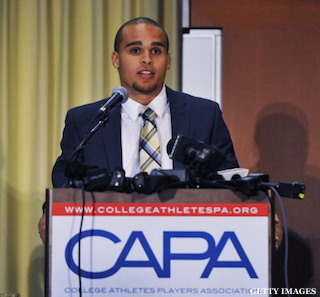
CHICAGO -- Kain Colter stepped to the podium at 11:30 a.m. Tuesday at the Hyatt Regency Chicago. It was far from his first press conference. For four seasons, Colter took the podium as a Northwestern Wildcats football player.
But this was not the friendly confines of Ryan Field in Evanston, Ill. Other than Teddy Greenstein of the Chicago Tribune and a handful of Northwestern student reporters, these were not the journalists Colter was used to addressing.
This was a press conference for national media in downtown Chicago. Kain Colter was no longer just a college quarterback. He became the face of national news.
He is the inaugural spokesman for the College Athletes Players Association (CAPA), an organization founded to help college football and basketball players be represented by a labor union.
"I'm pleased to announce that Northwestern football players have signed cards authorizing the College Athletes Players Association to serve their rights before the National Labor Board," Colter said. "The NFL has the NFLPA, the NBA has the NBAPA and now college athletes have the College Athletes Players Association."
Colter addressed the crowd alongside CAPA President Ramogi Huma, United Steelworkers (USW) President Leo W. Gerard and union national political director (and NCPA liason to the union) Tim Waters. The college senior made a statement and fielded questions.
The nation has its own questions. Who is Kain Colter and why is he doing this?
There are three parts to understanding Colter: The player, the person and the activist.
Colter didn't play until the 11th game of his freshman year at Northwestern, and he rushed for 143 yards in three games as a quarterback. As a sophomore, he started three games at quarterback in place of an injured Dan Persa and proceeded to play both quarterback and wide receiver in the next ten games. He had 43 receptions for 466 yards and three touchdowns in ten games at wide receiver.
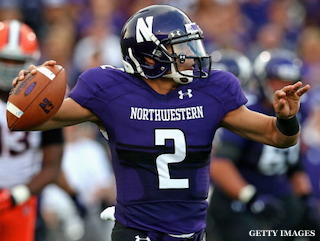
In his junior and senior seasons, Colter started every game he played in at quarterback, but he also took snaps as a wide receiver when quarterback "1B," Trevor Siemian," entered games. As a junior, Colter passed for 872 yards, rushed for 894 yards and had 196 receiving yards, as Northwestern won the Gator Bowl and finished No. 16 in the Coaches' Poll.
His senior year was derailed by various injuries, but Colter still put up 577 passing yards and 489 rushing yards in essentially seven full games (he left three games with game-ending injuries in the first quarter and missed two full games).
Colter, a two-year team co-captain, finished his college career with 2,160 passing yards, 2,180 rushing yards, 683 receiving yards and 50 total touchdowns in 40 games. Invited to the Senior Bowl, Colter was impressive in practice but an ankle injury sidelined him from the game.
"His football I.Q. from day one was off the charts," coach Pat Fitzgerald said of Colter in October.
Calling Colter the ultimate team player would be cliché. This is not necessarily a bad thing. In four seasons, he took snaps at multiple positions and learned a deep, spread offense playbook. He split time with Siemian and for much of his junior season, turned over the majority of rushing duties to 2012 second-team All-Big Ten running back Venric Mark.
Kain Colter was born and raised in Colorado by Spencer and Stacy Colter. Spencer was a safety on Colorado's 1990 national championship team. Kain starred as a quarterback at Cherry Creek High School in Denver where he earned first-team all-state honors as a senior. He lettered four years in football, four years in track and field (long jump/triple jump) and three years in basketball. He was listed as the No. 52 athlete in Rivals.com's class of 2010.
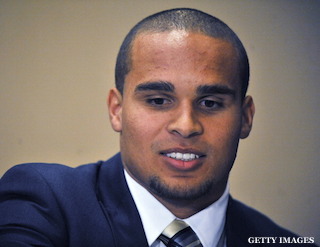
Colter was an honor roll student in high school, and his top two college choices were testament to his emphasis on education. He visited Northwestern in winter 2009, but he was drawn to another top academic institution: Stanford. In spring of that year, Colter committed to play for Jim Harbaugh in Palo Alto.
During his first game as a high school senior in the fall of 2009, Colter heard a pop in his arm. An MRI revealed a torn labrum and biceps. Colter played part of the season at running back and wide receiver, but his throwing was limited during the fall. After the injury, Stanford's contact with Colter dwindled.
"They just stopped calling," Spencer told the Chicago Tribune in 2011. "It was a bad situation. I wanted them to man up and talk to Kain."
Colter turned back to Northwestern, which in addition to strong academics had a personal connection for the family. The Wildcats' defensive coordinator Mike Hankwitz had been defensive coordinator and defensive backs coach for Spencer in Colorado.
During his time at Northwestern, Colter was a three-time Academic All-Big Ten honoree. Between the end of his junior academic year and the start of 2013 training camp, Colter, a psychology major, interned in Goldman Sachs' private wealth management department in Chicago. But it was a Northwestern course he took that summer called "Modern Workplace," that inspired him to push for college athletes to have more rights.
Tuesday's press conference was not the first time Colter has protested the treatment of college athletes.
On Sept. 21, when Northwestern hosted Maine, Colter put on a wristband donning the letters "A.P.U." Some of Colter's teammates also participated as part of a big weekend of publicity for All Players United, a movement by the National College Players Association for collegiate players' rights.
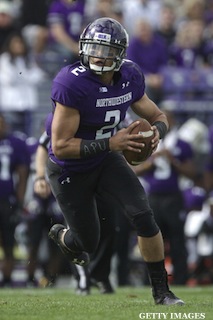
Of course, Colter was one of the louder players that weekend, and on Sept. 25, he spoke to the press about the initiative.
"People shouldn't take it as an individual message,“ Colter said that day. "It’s a sign of players coming together from all over the nation, not just football players, basketball players, tennis players, to be able to have our opinions heard and our needs met instead of having to go through a middle man, having to go through the coaches, having to go through the administration or athletic directors. I feel like we should have the right to voice our opinions and we’re educated we’re articulate enough to voice our concerns.”
At the time, Colter emphasized his goal was not to get college football player paid, a popular misconception among the press and fans. With all the revenue made from TV, retail and ticket, Colter expressed an interest to have some of that capital reverted to the athletes' needs.
Perhaps it was no coincidence that Colter wore the A.P.U. wristband just three weeks after suffering a concussion in the season opener at Cal.
“There needs to be a guarantee that players aren’t stuck with medical bills after they leave with long-lasting injuries that they suffer from football,” he says. “Essentially, they’re hurt on the job and then they're stuck with the medical bills if they do need a surgery down the line. That's one of the biggest things. With the TV revenue being generated, they could use a portion of that to help out the players in some way. I feel like there needs to be a trust fund generated. I don't feel like there needs to be a direct compensation, but there needs to a trust fund generated somehow that players can access after they graduate. I feel like that would put incentive for graduation rates to rise."
Fitzgerald had a mixed response. He runs a tight ship in terms of character, including a strict policy of dropping recruits who commit to Northwestern, then subsequently visit another school anyway. It's because he only wants players who buy into "The Northwestern Way." Academics and community service run parallel with a Wildcat's commitment to football, a concept not every FBS football player wants in college.
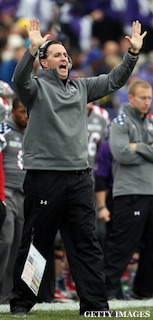
“I’m fully in support of what he’s doing. I would just like it to be within the team structure,” Fitzgerald said on Sept. 25. “I have nothing but the utmost respect for him as a person, for him as a student and obviously him as a player. I have been pretty steadfast in my comments believing what's best for the student-athletes. I believe in our guys, I believe in what they support, I think we gave back to about 85 or 86 different causes for about 2,000 hours for community outreach last year. Just because this it is a hot topic now, we’re talking about. Quite frankly, I think it’s really positive for the student-athletes. There's ways that we want to do it within our team and those are the things that him and I talked about.”
Colter made one comment that would foreshadow Tuesday's events. With one eye on the ABC primetime game versus Ohio State Northwestern would play a week and a half later, Colter also had an eye on the larger picture of the fight for college athletes' rights.
He was going to influence collegiate athletics beyond Evanston.
“This is bigger than Northwestern,” he said. “I love Northwestern, and I love my experience. I feel like people are making it me vs. Northwestern, us vs. the institution. It’s not that at all. It’s players coming together for a better cause.”
On Tuesday, Colter took his activism out of the Northwestern bubble. He entered the national spotlight. Colter acknowledges this is a fight that if won, he will not experience the benefits. It is a moral issue for Colter.
"This fight may take awhile and we understand many of us will have graduated before players receive protections," he said. "We realize, however, that to remain silent while players are denied justice is to be complicit and inflicted injustice on future generations of college athletes."
Unlike the first go-around with A.P.U. in September, this time Colter followed his coach's instructions. Colter said he "decided to take this issue to the team after season had concluded." He said an "overwhelming majority" of the players signed cards in support of CAPA.
This time, Fitzgerald, who often stresses the importance of "life" lessons that he and his staff pass along to the team, endorsed Colter's stance.
Kain and our student-athletes have followed their beliefs with great passion and courage. I'm incredibly proud of our young men! GO CATS!
— Pat Fitzgerald (@coachfitz51) January 28, 2014
Colter is choosing to fight the good fight for his fellow collegiate athletes, even if he will not experience the benefits first-hand.
"I can't help and see the same type of leader I saw in Romugi Huma over a decade ago," Waters said of Colter's leadership similarities to Huma, who played football for UCLA and is the president of CAPA.
It is hard to ignore the prestigious academic achievements of Colter and his fellow Wildcats. This past year, Northwestern football had an APR (Academic Progress Rate) score of 996, good for first in the nation.
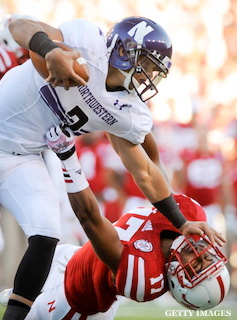
With top-notch academics and the visibility of Big Ten football, it makes sense that Northwestern has the formula for producing players who have a voice to make a difference. Colter and his teammates are not letting that go to waste. He is taking a stand.
Northwestern athletic director Jim Phillips released a statement to disagree with the idea of collective bargaining for its athletes but praised Colter for being an independent thinker. It read, in part:
"We love and are proud of our students. Northwestern teaches them to be leaders and independent thinkers who will make a positive impact on their communities, the nation and the world. Today's action demonstrates that they are doing so.
"We are pleased to note that the Northwestern students involved in this effort emphasized that they are not unhappy with the University, the football program or their treatment here, but are raising the concerns because of the importance of these issues nationally."
Get used to the name, nationally. Kain Colter is going to have an impact on college sports for a lot longer than he played Northwestern football.
-- Follow Jeffrey Eisenband on Twitter @JeffEisenband.




